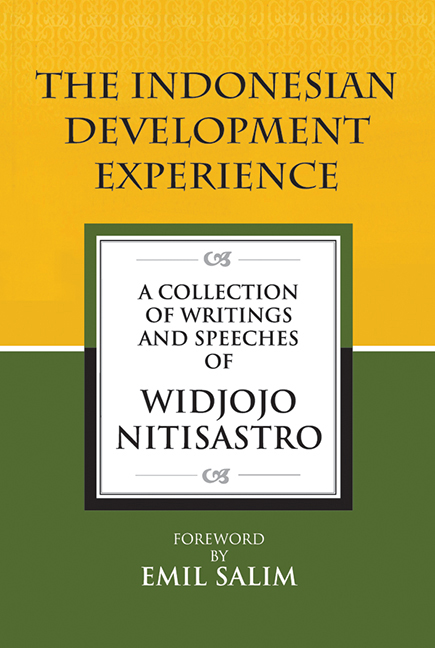Book contents
- Frontmatter
- Dedication
- Frontispiece
- Contents
- Foreword
- Introduction
- Part I PLANNING OF INDONESIA'S DEVELOPMENT
- Part II IMPLEMENTATION OF INDONESIA'S DEVELOPMENT
- Part III FACING VARIOUS ECONOMIC CRISES
- Part IV SETTLEMENT OF FOREIGN DEBT
- Part V EQUITABLE DEVELOPMENT
- Part VI INDONESIA AND THE WORLD
- 26 In the Mutual Interest of Rich and Poor Nations (1982)
- 27 Indonesia Chaired the OPEC Conference in Bali at a Time When Iran and Iraq were at War (1980)
- 28 Fifteen World Economic Phenomena That Stood Out During the Decade of the 1980s (1989)
- 29 Perception of Interdependence But Lack of Meaningful Action (1984)
- 30 Advancing Mutual Understanding and Mutual Confidence (1996)
- Index
- About the Author
27 - Indonesia Chaired the OPEC Conference in Bali at a Time When Iran and Iraq were at War (1980)
from Part VI - INDONESIA AND THE WORLD
Published online by Cambridge University Press: 21 October 2015
- Frontmatter
- Dedication
- Frontispiece
- Contents
- Foreword
- Introduction
- Part I PLANNING OF INDONESIA'S DEVELOPMENT
- Part II IMPLEMENTATION OF INDONESIA'S DEVELOPMENT
- Part III FACING VARIOUS ECONOMIC CRISES
- Part IV SETTLEMENT OF FOREIGN DEBT
- Part V EQUITABLE DEVELOPMENT
- Part VI INDONESIA AND THE WORLD
- 26 In the Mutual Interest of Rich and Poor Nations (1982)
- 27 Indonesia Chaired the OPEC Conference in Bali at a Time When Iran and Iraq were at War (1980)
- 28 Fifteen World Economic Phenomena That Stood Out During the Decade of the 1980s (1989)
- 29 Perception of Interdependence But Lack of Meaningful Action (1984)
- 30 Advancing Mutual Understanding and Mutual Confidence (1996)
- Index
- About the Author
Summary
Introductory Note: Professor Subroto served as Minister of Energy and Mining for ten years. Later he became Secretary General of OPEC for six years. OPEC is the Organization of Petroleum Exporting Countries, whose members include Saudi Arabia, Iraq, Iran, Kuwait, Libya, Algeria, Venezuela, Angola, and Indonesia.
When he was no longer Minister of Energy, the energy ministers of OPEC member countries all together requested that Professor Subroto assume the post of Secretary General of OPEC because for ten years they had known Professor Subroto as a very wise gentleman and a figure who had always succeeded in bridging the divide between OPEC members infamous for their mutual opposition.
In 1980, when Professor Subroto was still Indonesia's Minister of Energy, something happened that could never be forgotten by the energy ministers of the other OPEC countries. In their meeting early that year, it was agreed that the OPEC session of 1980 would take place in Bali, Indonesia.
However, the Iraq-Iran war broke out in that same year. A decision was then required as to whether the session would remain slated or be put off. The OPEC annual sessions always set the prices of petroleum produced by OPEC countries. New prices would determine the growth of crude oil prices in the world. If the session were to be postponed, there would be no world oil price consensus. This situation could create chaos on the world crude oil market. If the OPEC session in Bali was to get underway as planned, the Iraq-Iran war would likely continue in Bali. The decision to proceed with or delay the OPEC session was left to the host, who would preside over it. What was Indonesia's decision and what happened?
In 1973 Professor Subroto became Minister of Manpower, Transmigration and Cooperatives and, in 1978, he was appointed Minister of Mining and Energy, a post which he held for ten years through 1988. He gained a great deal of experience as Minister of Mining and Energy, which covered the sectors of petroleum and natural gas, various other fields of mining and electricity development for the population, as well as for the support of industrial growth.
In the petroleum sector, Minister Subroto kept striving for the continuity of Indonesia's crude oil production and exploration, the growth of domestic crude oil processing and the continuous development of crude oil exports.
- Type
- Chapter
- Information
- The Indonesian Development ExperienceA Collection of Writings and Speeches, pp. 304 - 309Publisher: ISEAS–Yusof Ishak InstitutePrint publication year: 2011



